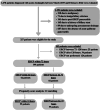Effect of Urgent ERCP on Clinical Outcomes in Acute Cholangitis With Concurrent Acute Gallstone Pancreatitis: A Propensity Score Matching Analysis
- PMID: 40474397
- PMCID: PMC12380036
- DOI: 10.1002/jhbp.12164
Effect of Urgent ERCP on Clinical Outcomes in Acute Cholangitis With Concurrent Acute Gallstone Pancreatitis: A Propensity Score Matching Analysis
Abstract
Background/purpose: Current guidelines do not provide specific recommendations regarding the timing of endoscopic retrograde cholangiopancreatography (ERCP) in patients with acute cholangitis (AC) concurrent with acute gallstone pancreatitis (AGP). This study evaluated the impact of ERCP timing on clinical outcomes.
Methods: A total of 144 patients diagnosed with AC concurrent with AGP between March 2019 and February 2024 were included in the study. Patients were classified into two groups: urgent ERCP group (ERCP ≤ 24 h) and non-urgent ERCP group (ERCP 24-72 h). Clinical outcomes were compared using propensity score matching (PSM) analysis.
Results: After PSM, two well-balanced groups of 55 patients were created. The median ERCP time was 18 (13-21) hours in the urgent group and 41 (36-54) hours in the non-urgent group. There was no significant difference in composite outcomes, including in-hospital mortality, prolonged hospital stay, severe pancreatitis, or late localized/systemic complications of pancreatitis [11 (20%) vs. 16 (29.1%); p = 0.268]. Additionally, no significant difference was observed between the groups regarding prolonged hospital stay (p = 0.506), ICU admission (p = 0.680), or in-hospital mortality (p = 0.161).
Conclusions: Urgent ERCP within 24 h does not significantly improve clinical outcomes compared to ERCP performed within 24-72 h in patients with AC and AGP.
Keywords: acute cholangitis; acute gallstone pancreatitis; choledocholithiasis; propensity score; urgent ERCP.
© 2025 The Author(s). Journal of Hepato‐Biliary‐Pancreatic Sciences published by John Wiley & Sons Australia, Ltd on behalf of Japanese Society of Hepato‐Biliary‐Pancreatic Surgery.
Conflict of interest statement
The authors declare no conflicts of interest.
References
-
- Farooq U., Gondal A. B., Franco D., Tarar Z. I., and Mahmood S., “Validation of Tokyo Guidelines 2018 for Safety and Mortality Benefit From Urgent ERCP in Acute Cholangitis Across Different Age Groups,” Journal of Hepato‐Biliary‐Pancreatic Sciences 30 (2023): 737–744. - PubMed
-
- Raraty M. G., Finch M., and Neoptolemos J. P., “Acute Cholangitis and Pancreatitis Secondary to Common Duct Stones: Management Update,” World Journal of Surgery 22 (1998): 1155–1161. - PubMed
-
- Gomi H., Solomkin J. S., Schlossberg D., et al., “Tokyo Guidelines 2018: Antimicrobial Therapy for Acute Cholangitis and Cholecystitis,” Journal of Hepato‐Biliary‐Pancreatic Sciences 25 (2018): 3–16. - PubMed
-
- Kiriyama S., Kozaka K., Takada T., et al., “Tokyo Guidelines 2018: Diagnostic Criteria and Severity Grading of Acute Cholangitis (With Videos),” Journal of Hepato‐Biliary‐Pancreatic Sciences 25 (2018): 17–30. - PubMed
MeSH terms
LinkOut - more resources
Full Text Sources
Medical
Miscellaneous


